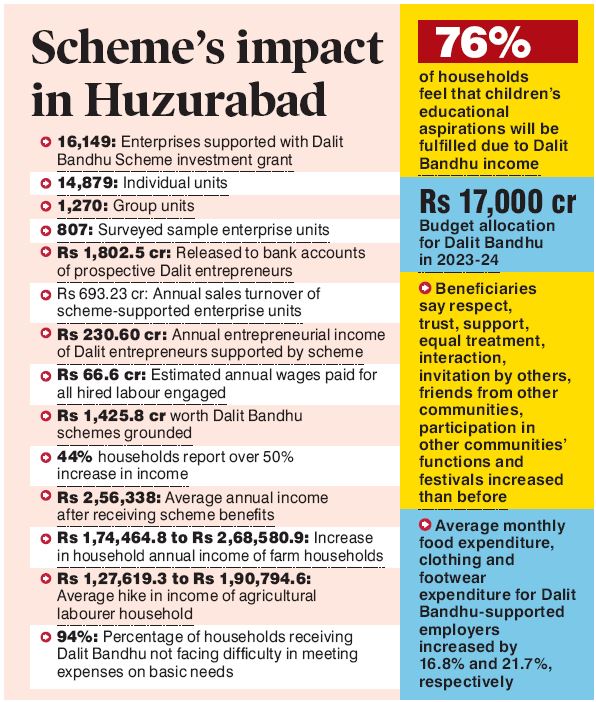According to the study report, Dalit Bandhu has reduced the employment insecurity of households and provided additional employment opportunity as well as increased the number of working days for workers.
Published Date – 10:28 PM, Wed – 15 November 23

Hyderabad: The Dalit Bandhu scheme — the social investment project meant to empower the Dalit community in Telangana — had a promising start in the Huzurabad constituency, which has witnessed a considerable increase in the standard of living of the beneficiaries, according to an assessment and evaluation of the scheme conducted by the Centre for Economic and Social Studies (CESS). The report has been submitted to the Karimnagar District Collector. The CESS was entrusted with the task of assessing the scheme, a flagship programme of the State government introduced in August 2021.
According to the study report, Dalit Bandhu has reduced the employment insecurity of households and provided additional employment opportunity as well as increased the number of working days for workers. Analysis of changes in household conditions showed that there was an improvement among Dalit entrepreneurial households and that their living standards had improved after they got Dalit Bandhu benefits compared to the situation before.
On average, the annual income of farm households has increased from Rs 1,74,464.8 to Rs 2,68,580.9. This implies that the annual income of farm households has increased by about 50 per cent within one to two years. The income diversification induced by Dalit Bandhu has resulted in a sudden hike in their income. Around 21 per cent of farm households have witnessed a doubling of their annual income during the same period.

Likewise, agricultural labourers’ households have also witnessed a 50 per cent hike in their income on average, from Rs 1,27,619.3 to Rs 1,90,794.6 during the same period. About 19 per cent of these households witnessed a doubling of their annual income. Even the percentage of households not facing difficulty in meeting expenses on basic needs has drastically increased from about 71 per cent to 94 per cent.
The report further stated that though on average a lower percentage of Dalit Bandhu households are indebted, the level of debt is high and repayment is also high. This shows a higher financial appetite and capacity to absorb indicating a higher economic value added through their businesses. One of the key findings was that about one-fourth of the total households reported that their previously unemployed member got employment because of Dalit Bandhu.
A total of 226 previously unemployed or homemakers started working in scheme enterprises. About half of the households have reported the number of working days has increased due to the scheme for their household members. The report stated that interventions such as Dalit Bandhu have the potential to realise the latent talent of socially marginalised communities, leading to the development of the community as well as contributing to economic development. Based on the sample survey results and sampling weights, the results were estimated for all 18,021 households in the Huzurabad constituency. For the control group, the results were presented for 153 control group households. The average household size of Dalit Bandhu and Control group households are 3.7 and 3.6 persons respectively. The study surveyed a sample of 807 Dalit Bandhu enterprises spread over five mandals and two municipalities of the constituency covering all seven sectors of the units.
The sample comprised five per cent of the total units grounded in the constituency. All selected units have been operational for at least the last six months from the date of the survey. Dalit Bandhu was implemented as a pilot programme in the Huzurabad constituency on saturation mode in August 2021. The scheme grants Rs 10 lakh per Dalit household for setting up any income generating unit (IGU) or enterprise of their choice.



